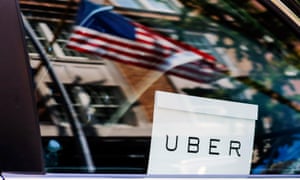
drivers working for taxi-hailing apps Uber and Lyft could get an early Christmas present on Monday when the city council is set to vote on whether to let them unionize. If the legislation were to pass, these on-demand drivers would be able to collectively bargain their future contract and pay.
Federal government has been hesitant to pass legislation relating to the “gig economy”, where freelance contractors provide the service in demand, but local and state governments have had to face the issue head on – setting up a politically explosive fight between the tech companies and officials.
“It’s clear the nature of work has shifted in part because of technology and in part because there are corporations that don’t like labor protections,” Mike O’Brien, a city council who introduced the Seattle measure, told the New York Times. “What is that reality going to look like? I believe there should be some solutions.”
Uber – which is said to be valued at more than $50bn making it more valuable than car company General Motors – insists that its drivers are contractors. Instead of being considered as employees, Uber drivers are considered “partners”.
Some drivers disagree with this description of their relationship with Uber. Since the company makes deductions from their pay, decides which routes they take, can penalize them and even let them go, they insist Uber is more of an employerthan a partner. As such, they want to have the rights of a typical employee – including the right to unionize.
Seattle drivers pushing for the legislation to pass belong to App-Based Drivers Association, ABDA, and are likely to join the Seattle Teamsters Local 117 union if it passes. The city has 14,000 registered drivers-for-hire that the Local 117 believes would choose it to represent them come time to negotiate a new contract.
Both Uber and Lyft insist that their drivers do this job because it allows them to be flexible.
“Drivers say that with flexible and independent work with Uber, 50% of them drive fewer than 10 hours a week, 70% have a full-time or part-time work outside of Uber, and 65% choose to vary the hours they drive 25% week to week,” Ubersaid in a statement.
In an interview with KUOW, a Seattle-based radio station, David Plouffe – former campaign manager for President Barack Obama and current board member and chief adviser to Uber – said that he is “puzzled” by Seattle’s proposal.
“Presumably the city’s had to spend a lot of money on this and presumably might have to spend a lot more to defend what is almost assuredly something that’s going to be ruled to be illegal,” Plouffe said.
According to O’Brien, the proposal is “legally defensible”. If passed, a similar proposal could be taken up by teamsters in Oakland, California.
O’Brien is not the only politician calling for solutions. Earlier this year, the 2016 Democratic presidential candidate Hillary Clinton said that while the on-demand, gig economy is creating innovations, it is also “raising hard questions about workplace protections and what a good job will look like in the future”.
[Source:- the Gurdian]
